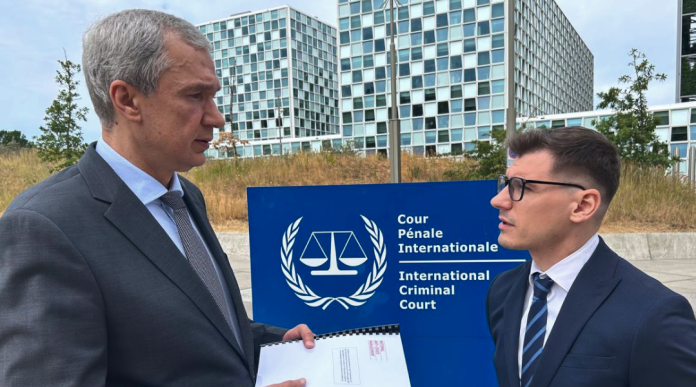A Belarusian opposition activist asserts he has provided the International Criminal Court (ICC) with evidence that spells out how President Alexander Lukashenko cleared the way for the forcible removal of Ukrainian children to Belarus, allegations that official Minsk hotly denies.
Moscow’s closest ally, Lukashenko allowed the Kremlin to use Belarus as a staging post for the despatch of Russian troops and weapons into Ukraine. He has welcomed the continuing Russian military presence in Belarus including the deployment of some of Russia’s tactical nuclear weapons there. Lukashenko has also agreed to tighter economic, political and defence links between the two countries, a not quite complete merger that has been described as a “state union”.
Earlier this week, former Belarusian Culture Minister and member of the United Transitional Cabinet of Belarus Pavel Latushka let it be known that he had handed over materials to the ICC indicating that 2,100 or more children from some 15 Russian-occupied cities in Ukraine had been removed forcibly to Belarus with Lukashenko’s assent. The ex-minister said he hoped the evidence he had provided would result in an ICC warrant for Lukashenko’s arrest, just as a previous ICC warrant had been issued last March for President Vladimir Putin.
Then, the ICC issued warrants for Putin and Russia’s Children’s Rights Commissioner, Maria Lvova-Belova. Judges in The Hague declared they had found “reasonable grounds to believe” the two were responsible for war crimes involving the unlawful deportation and transfer of children from occupied areas of Ukraine to Russia, charges Moscow vehemently rejected.
Speaking to the wire service AP this week, Latushka stated that Ukrainian children “under the guardianship of the Ukrainian state, including orphans, children with disabilities and those whose parents were stripped of their parental rights”, had been “illegally transferred” to Belarus. The materials he had furnished the ICC with, he declared, proved Lukashenko had “personally signed the documents under the auspices of the so-called union state of Russia and Belarus that provided a basis for organizing and funding the transfer of Ukrainian children to Belarus.”
An online statement published by Latushka’s anti-Lukashenko National Anti-Crisis Management Group claims to have evidence that the Ukrainian children were placed in five Belarusian summer camps and health resorts.
On Tuesday, dismissing Latushka’s accusations as “madness”, Lukashenko said Belarus had hosted the children on a temporary basis in order to help them recover from the trauma of the war in Ukraine, adding that he and Putin had agreed to fund the children’s stay in Belarus from the state budget. “This is how we started taking them here,” Lukashenko said Tuesday. “We help improve their health and they leave. They actually don’t want to leave.”
Lukashenko accused Latushka, who was forced to depart Belarus after the former’s contentious and controversial re-election in 2020, of attempting to manufacture an ICC case against him. Latushka, now living in self-imposed exile in Poland, says he has received more and more death threats as he presses forward his investigation into the alleged forced transfers of children.
Speaking to the AP, he charged that along with Lukashenko, at least four other people have been involved in transferring Ukrainian children to Belarus, including Dmitry Mezentsev, a top official within the Russo-Belarusian “union state” structure, Ivan Golovaty, the head of state-owned Belarusian fertilizer exporter Belaruskali, Alexei Talai, the head of a government-supported charity fund, and Olga Volkova, a pro-Russia activist in Ukraine’s partially-occupied Donetsk region.
Documents published by Latushka’s opposition group include a copy of a letter dated March 23 signed by Dmitry Mezentsev, a top official within the Russo-Belarusian “union state” structure, addressed to the head of Russia’s national rail operator, Russian Railways, asking that it jointly organize “the transportation of the children” from Ukraine’s industrial east “for rehabilitation to brotherly Belarus.”
The letter refers to a decision by Putin and Lukashenko to provide “humanitarian aid” to the children, and cites plans to resettle almost 2,000 orphans and children living “in harsh conditions” to Belarus this year. It notes that 1,050 minors would be transferred in April and May, with another 908 to follow later in the year. It also indicated that an unspecified number of minors had been taken to Belarus last year, a state-funded joint effort by Russian and Belarusian rail operators.
Belarusian authorities announced their readiness to host more than 1,000 children aged 6-to-15 from Russian-occupied parts of Ukraine for “recovery”. The first 350 were reported as having arrived in Belarus in April.
Any group or individual can send evidence of alleged crimes to the ICC. Prosecutors assess submissions to “identify those that appear to fall within the jurisdiction of the Court and warrant further action,” according to the ICC website. Last month, the Ukrainian Prosecutor General’s office announced that it had launched an investigation into the forced transfer of Ukrainian children to Belarus.

